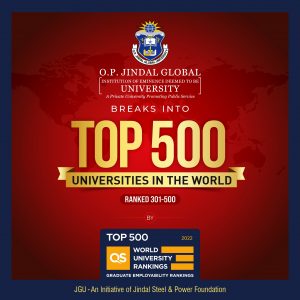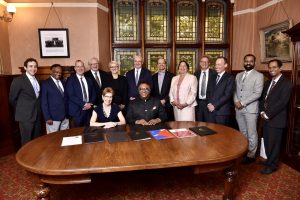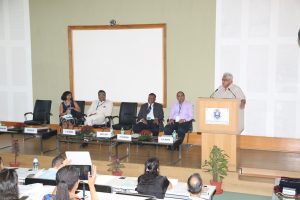Sonipat, April 11, 2016 – Sonipat based O.P. Jindal Global University conducted a day-long seminar in the Kashmir University campus in Srinagar on Sunday, April 10th, on the theme of “Economic Growth and Development in Kashmir”.
The deliberations focused on policy inadequacies and failures in the state of Jammu and Kashmir with regard to key problems such as livelihoods, physical infrastructure, socio-economic inequalities, energy crisis, educational paradigms and the flawed developmental models which have failed to meet the local aspirations of Kashmiri people.
Professor Gul Wani argued in this dialogue that “any form of Liberal economics should also follow Liberal politics and the latter has unfortunately eluded the region in which Kashmir exists”.
Mr. Shakeel Qalander emphasized on the need to develop the small-scale enterprises for resolving the rapidly increasing youth unemployment problem in Kashmir, where almost 40% of the existing labour force is currently employed in the government sector.
He added that greater focus should be given on indigenous skill development for encouraging local entrepreneurs who can acquire these skills from outside the state and then return and add value by setting up local businesses across the valley.
Professor Maroof Shah talked about the declining intellectual standards in Kashmir and the lack of deep knowledge in all spheres leading to economic loss and underutilization of the full economic potential of Kashmir.
Dr. Peer Suhail criticized the National Hydro Power Corporation’s land acquisition policies, saying that they are disempowering local institutions and people.
Dr. Javed Iqbal spoke on the energy crisis in Kashmir where almost 25% of the total state population still lives without electricity. He emphasized how critical it is for the state to invest in micro-hydro power projects and improve royalty sharing on power purchase agreements signed between Centre and State Government
Professor Rajeev Malhotra said on this occasion that Chief Minister Ms. Mehbooba Mufti will do better to focus on sectors in which Jammu and Kashmir as a state has under-performed, including areas like provision of primary healthcare access, infant mortality rate and income inequalities.
Explaining the motto of the university, Professor Sreeram Chaulia of the Jindal School of International Affairs, said “There is a serious thirst and hunger in Kashmir to engage in dialogue with national and international scholars that can broaden the horizons and produce reasoned opinions about policy problems. Too often, ideologically rigid positions lacking in rational and scientific bases have been dominating public discourse in Kashmir. Our university is a catalyst to support Kashmiris who want informed and knowledgeable experts to come and interact with them. We are knowledge partners for a peaceful and prosperous Kashmir.”
Panelists in this event felt that economic data collection methods need to be made more rigorous in order to inform better policymaking in the state. The panelists also agreed that trans-border trade in energy and other goods and services would create a massive economic boom in Kashmir.
The panelists included Professor Rajeev Malhotra of Jindal School of Government and Public Policy, Professor Kathleen Modrowski of the Jindal School of Liberal Arts and Humanities, Professor Sreeram Chaulia and Professor Deepanshu Mohan of the Jindal School of International Affairs. Prominent Kashmiri intellectuals who spoke at this event included, Mr. Noor Ahmed Baba, Professor Gul Wani, Dr. Muhammad Maroof Shah, Mr. Shakeel Qalander and Dr. Peer Suhail.
This was the fifth such event conducted by O.P. Jindal Global University in Kashmir valley over the last two years. Earlier, it had organised intellectually stimulating and policy relevant seminars and workshops on ‘Disaster Management Lessons from around the World after the Kashmir Floods’, ‘A Political Settlement of the Kashmir Problem’, ‘The Higher Education Crisis in Kashmir’, and ‘Governance Challenges Facing Kashmir’.
For Enquiries and Clarifications, please contact Professor Sreeram Chaulia 08930110700
Jindal University organizes dialogue on Economic development in Kashmir
- Experts debate Kashmir’s Economic Problems & Opportunities
- Seminar Proposes Alternative Economic Models for Kashmir
Sonipat, April 11, 2106 – Sonipat based O.P. Jindal Global University conducted a day-long seminar in the Kashmir University campus in Srinagar on Sunday, April 10th, on the theme of “Economic Growth and Development in Kashmir”.
The deliberations focused on policy inadequacies and failures in the state of Jammu and Kashmir with regard to key problems such as livelihoods, physical infrastructure, socio-economic inequalities, energy crisis, educational paradigms and the flawed developmental models which have failed to meet the local aspirations of Kashmiri people.
Professor Gul Wani argued in this dialogue that “any form of Liberal economics should also follow Liberal politics and the latter has unfortunately eluded the region in which Kashmir exists”.
Mr. Shakeel Qalander emphasized on the need to develop the small-scale enterprises for resolving the rapidly increasing youth unemployment problem in Kashmir, where almost 40% of the existing labour force is currently employed in the government sector.
He added that greater focus should be given on indigenous skill development for encouraging local entrepreneurs who can acquire these skills from outside the state and then return and add value by setting up local businesses across the valley.
Professor Maroof Shah talked about the declining intellectual standards in Kashmir and the lack of deep knowledge in all spheres leading to economic loss and underutilization of the full economic potential of Kashmir.
Dr. Peer Suhail criticized the National Hydro Power Corporation’s land acquisition policies, saying that they are disempowering local institutions and people.
Dr. Javed Iqbal spoke on the energy crisis in Kashmir where almost 25% of the total state population still lives without electricity. He emphasized how critical it is for the state to invest in micro-hydro power projects and improve royalty sharing on power purchase agreements signed between Centre and State Government
Professor Rajeev Malhotra said on this occasion that Chief Minister Ms. Mehbooba Mufti will do better to focus on sectors in which Jammu and Kashmir as a state has under-performed, including areas like provision of primary healthcare access, infant mortality rate and income inequalities.
Explaining the motto of the university, Professor Sreeram Chaulia of the Jindal School of International Affairs, said “There is a serious thirst and hunger in Kashmir to engage in dialogue with national and international scholars that can broaden the horizons and produce reasoned opinions about policy problems. Too often, ideologically rigid positions lacking in rational and scientific bases have been dominating public discourse in Kashmir. Our university is a catalyst to support Kashmiris who want informed and knowledgeable experts to come and interact with them. We are knowledge partners for a peaceful and prosperous Kashmir.”
Panelists in this event felt that economic data collection methods need to be made more rigorous in order to inform better policymaking in the state. The panelists also agreed that trans-border trade in energy and other goods and services would create a massive economic boom in Kashmir.
The panelists included Professor Rajeev Malhotra of Jindal School of Government and Public Policy, Professor Kathleen Modrowski of the Jindal School of Liberal Arts and Humanities, Professor Sreeram Chaulia and Professor Deepanshu Mohan of the Jindal School of International Affairs. Prominent Kashmiri intellectuals who spoke at this event included, Mr. Noor Ahmed Baba, Professor Gul Wani, Dr. Muhammad Maroof Shah, Mr. Shakeel Qalander and Dr. Peer Suhail.
This was the fifth such event conducted by O.P. Jindal Global University in Kashmir valley over the last two years. Earlier, it had organised intellectually stimulating and policy relevant seminars and workshops on ‘Disaster Management Lessons from around the World after the Kashmir Floods’, ‘A Political Settlement of the Kashmir Problem’, ‘The Higher Education Crisis in Kashmir’, and ‘Governance Challenges Facing Kashmir’.



